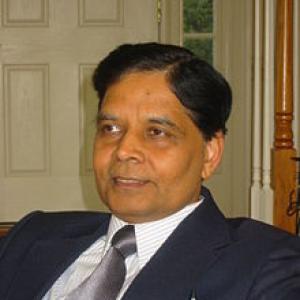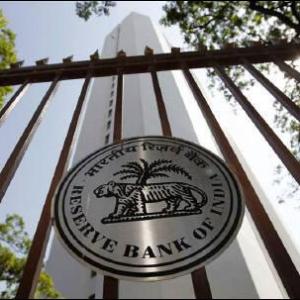Ravneet Gill, Deutsche Bank India CEO thinks the banking regulator and the government are doing an earnest job of building the blocks for future growth and regaining the trust of investors.
 The lunch venue is changed thrice by his office just to make sure that the boss gets a quiet corner.
The lunch venue is changed thrice by his office just to make sure that the boss gets a quiet corner.
Even the steward at India Jones, the pan-Asian restaurant in the basement of Hotel Trident, hurriedly changes the original table allotted to us to make sure that our conversation happens in relative peace.
But at the end of it all, we still take time to get used to the noisy enthusiasm of people in adjoining tables, who appear to have found this an ideal location to put their vocal muscles to good use.
Our guest, Ravneet Gill, chief executive officer (CEO) of Deutsche Bank in India, ignores our apparent irritation and tells us how he is fascinated by the “Mumbai spirit” and how he can’t wait to come back to the city just to admire its super-fast pace and work ethics every time he has to go out for his personal or professional commitments.
“I find the pace of life in some of the other financial capitals of the world much slower than that of Mumbai,” he says.
Gill, dressed in a sharp black suit, makes quite a few other right noises, too.
He thinks the banking regulator and the government are doing an earnest job of building the blocks for future growth and regaining the trust of investors.
For example, he recounts the experience of the top team of a sovereign wealth fund, which was scheduled to meet quite a few Union ministers on a day when Parliament was rocked by the land Bill controversy.
“The meetings were fixed much in advance but we were almost sure they would be cancelled given the soaring political temperature.
To our surprise, each of the meetings was held on schedule.
The finance minister was late by just about five minutes, gave us a patient hearing and even apologised for being late,” Gill says, adding how the wealth fund is sold on India and is planning to ramp up its India allocation by a healthy margin.
More such first-time investors are willing to put in money in India, which is looking much better from a fundamental perspective, he says.
We ask whether his enthusiasm is shared by his clients, many of whom are feeling the pressure of a stretched balance sheet.
The answer comes fast: “Well, my blood group is B+ and I suppose being positive is in my blood,” Gill says with a broad smile.
But sensing that we are not convinced by the one-liner, he is quick to point out that expecting the private sector, which is either over-leveraged or suffering from over-capacity, to invest is wishful thinking and hence, public investment is the only way to go.
His interactions with the ministries of defence, railways, power and transport give him enough confidence that what we need is a little more patience.
The CEO has clearly taken charge at the lunch table, too.
Without even taking a look at the menu, Gill rattles off the names of five dishes — steamed rice, prawns tamarind, steamed bean curd, roast duck and Chinese greens, apart from soup.
He explains with a grin: “Most of these dishes are available at all restaurants, so the need to look at the menu doesn’t arise.”
Point noted. Before the soup is served, we also come to know something that seems a trademark of all those who have taken a super-fast escalator to the corner office — he is an art lover, a fitness enthusiast (one room in his flat has been turned into a gym where he works out for one and a half hours every day) and a complete family man (sample this: “I thank my wife for enduring me and our two boys for talking only about sports at the dining table everyday”).
But Gill surely knows how to let his hair down a bit, in the process giving us a sneak peek into the man behind the CEO.
For example, he finds being in the gym a necessity but quite boring.
“I do it only because I have a sweet tooth and need to exercise to be able to eat all that I want,” he quips.
Also, time has never been a handicap for him to play cricket — he is a middle-order batsman and opening bowler for the Deutsche Bank team, which plays quite a few “corporate games” with clients. “I play to win even though my colleagues keep telling me that I should take it easy when playing against a client’s team,” he says with a straight face.
While we start digging into the food, Gill also tells us how he had to face questions from all and sundry as to why he chose banking as a profession after doing his Master’s degree in political science from Hindu College in Delhi.
He admits to being defensive in his answers till one of his friends suggested a counter question: “Why not?”
The questions stopped after that. There’s more.
Unlike many of his peers in other marquee institutions, he doesn’t have an MBA degree.
But Gill says he wants to figure out from his elder son, who is planning to pursue an MBA, as to what he has missed out on by not being in that club.
Gill says he is the only one in the family to have moved to the private sector.
His father was in the Indian Administrative Service and obviously wanted his son to do the same.
But the son had other ideas.
Though he passed the preliminary exam, he never appeared for the Mains as he wanted to become a banker like many of his batchmates in the 1980s.
But in deference to his mother’s wish that he should work only for the State Bank of India (SBI), Gill joined BCCI Bank, which was later merged with SBI.
He left the job after five years.
SBI’s loss has clearly been a big gain for Deutsche Bank where he joined as relationship manager and gradually worked with almost every vertical, including corporate banking, capital markets and treasury solutions, before moving into the corner office three years ago.
The shift from pure corporate banking to markets was the most challenging and played a huge role in shaping his 360-degree view, Gill says and proceeds to give the reason: “The sense of urgency and more importantly the sense of expectation that the organisation has from you was much more intense and greater than the other side. It is three to four times tougher.”
Photograph: A video grab from the Sanctuary Wildlife Awards 2014.










